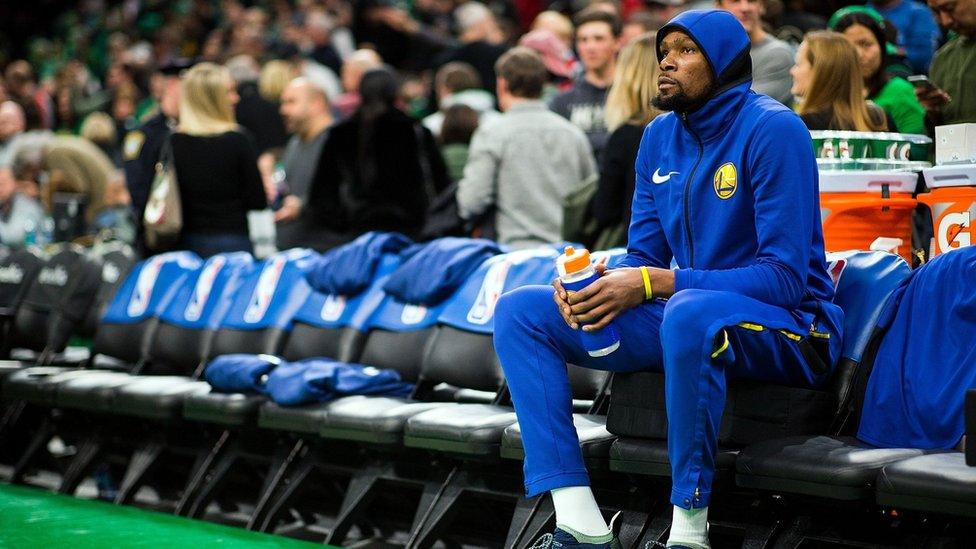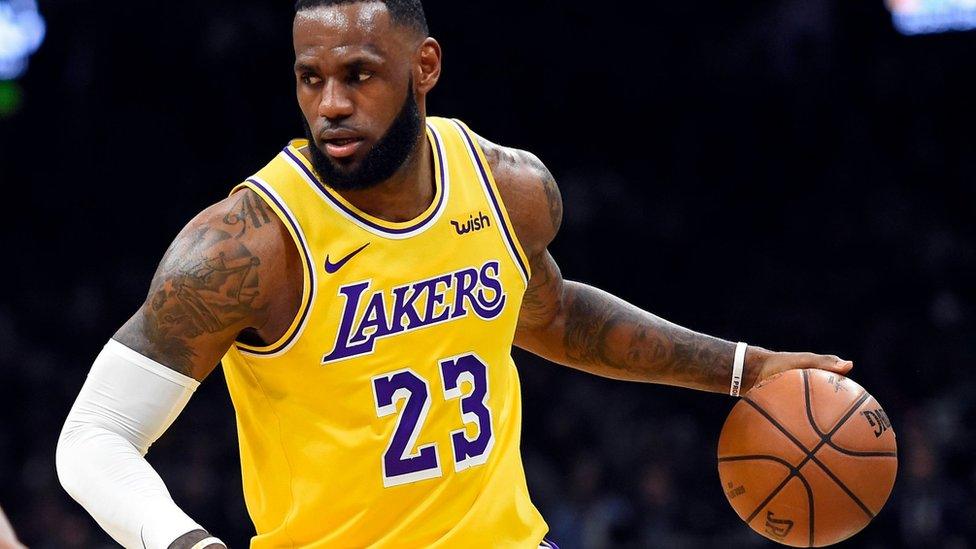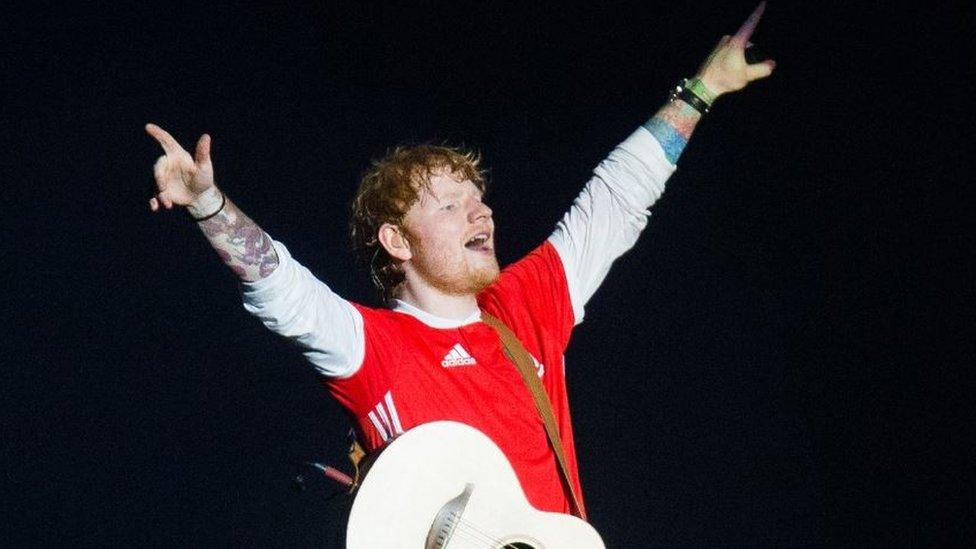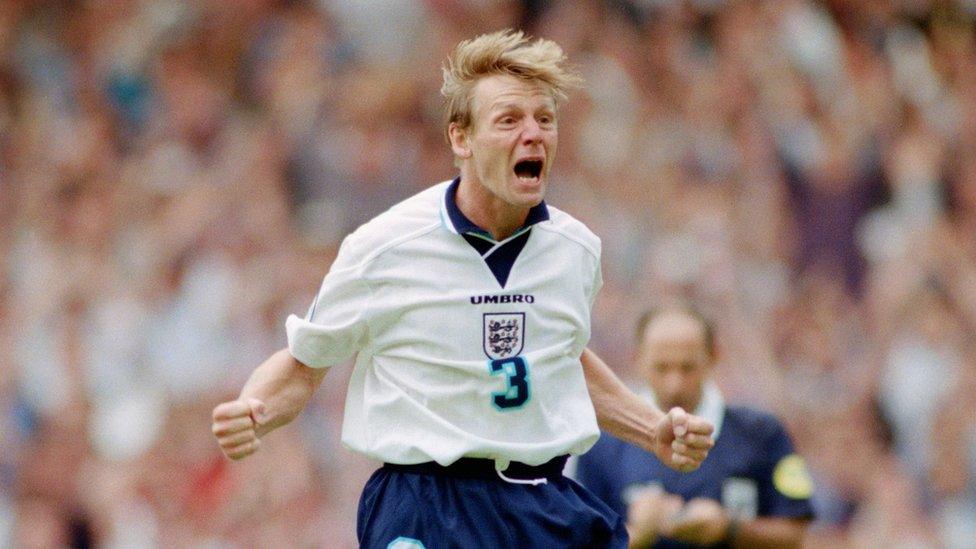Favourite player's injured? Get a refund
- Published
- comments

Sidelined: If a star like Kevin Durant doesn't play, Fansure will refund you the cost of your ticket
Any sports fan will know, or at least appreciate, the disappointment of going to watch your team only to find that a top player has been left out.
But what if you could pay an extra bit of money for your ticket - say, 5-15% on top of the normal price - and insure the cost of your ticket against such a situation? If your favourite player does not play, for whatever reason, you get your money back.
That’s the intriguing premise behind Fansure, external, a start-up currently based in Belmont, California. When I spoke to the firm’s marketing manager, Tara Fan, she explained it in the context of a basketball game:
“Some tickets are $300-$400 to go to a game. Typically, you’re paying that to see someone like LeBron James, or Kevin Durant, or someone like that.”
It works like this: You buy the ticket as normal. Then, at least 48 hours before the game, you go to Fansure, and you pay them an added percentage. The amount reflects what Fansure thinks is the likelihood of your selected player appearing or not. Someone like Durant for instance, rarely misses a game for the Golden State Warriors and so the premium would be relatively low.
“It would only be, I would say, 8% of your ticket price,” Ms Fan explained. "It's like... $30 to cover a $400 ticket. And so that's where the benefit rolls out.”
If Durant plays, you’ve wasted your $30, which Fansure pockets. If he doesn’t, you still get to go and enjoy the game, and Fansure will refund you the entire amount of the ticket (but keeps the bit you paid for insurance).
Statistics-obsessed
Naturally, if it’s completely obvious that a person won’t play, Fansure will refuse to insure it. The rest is a delicate calculation the firm can't afford to get wrong too often.
So far the company has insured fewer than 50 tickets, but the early signs are promising - it hasn’t yet had to make a single payout. At the moment, this process is being done manually, with humans doing the calculating based on statistics sourced from the NBA.
In the “next month or so” the company plans to launch fully with a more-automated system that uses an algorithm - what it calls the Fansure Index, external - to speed up the process. Soon it hopes to offer protection for tickets to American Football and baseball, with soccer and other sports to come later.

LeBron James is a big driver of ticket sales at his new team, the LA Lakers
But if this idea is to scale, the algorithms will have to do some very smart crunching with a dataset I’m not sure exists yet. Though, in the statistics-obsessed world of American sports, I’m sure it can be done. A lot of course depends on money. Right now Fansure is “bootstrapped” - the start-up world's term for not yet having investment beyond the team's own wealth.
Looking even further forward, there is an obvious opportunity for this concept to be used for other purposes too, such as adaptive ticket pricing based on how “valuable” a game is to the fan. Or, it could be a method of determining which games should be televised.
Ms Fan told me that sports could just be a starting point. The firm has plans to look into the viability of offering insurance for festival headliners not turning up, or Broadway stars being replaced by their understudies.
Saving tears
Back to basketball, I wondered what would happen if, in the first minute, Kevin Durant sprained his ankle and hobbled off? Right now, Ms Fan said, that would be considered an appearance: “It’s a binary ‘yes’ or ‘no’.”
But she said the company could perhaps look at such instances on a case-by-case basis, offering partial refunds for short appearances, on a sliding scale.
She said they’d consider other scenarios too, such as a team getting heavily beaten - a kind of disappointment (or embarrassment) insurance, so to speak.
“What we’re doing is providing protection for your experience."
The whole idea reminded me of a friend who often used to place a bet against our team, Cambridge United, so that if they lost he’d at least have something to be mildly cheerful about. Needless to say, I still hold him entirely responsible for the team’s relegation in 2005. It just felt wrong.
But there’s obviously great appeal here. Picture a parent saving up hundreds of dollars to take the kids to see their idol LeBron James, only for him to be injured that day. With a system like this, the parent can perhaps afford to take them to another game soon, saving plenty of tears.
Then again, I can’t help feeling some hesitation towards any idea that pushes sport further into feeling like entertainment. It’s a fact of life: some games will be boring, sometimes your team will get smashed to bits, and sometimes the best players won’t play. A “boring” nil-nil can often be anything but.
I say disappointment is surely as much a part of sport as enjoyment and, besides, when it comes to stars, you’re meant to be there to support a team - not an individual. But maybe that's just me.
_____
Follow Dave Lee on Twitter @DaveLeeBBC, external
Do you have more information about this or any other technology story? You can reach Dave directly and securely through encrypted messaging app Signal on: +1 (628) 400-7370
- Published26 June 2018

- Published30 April 2018
